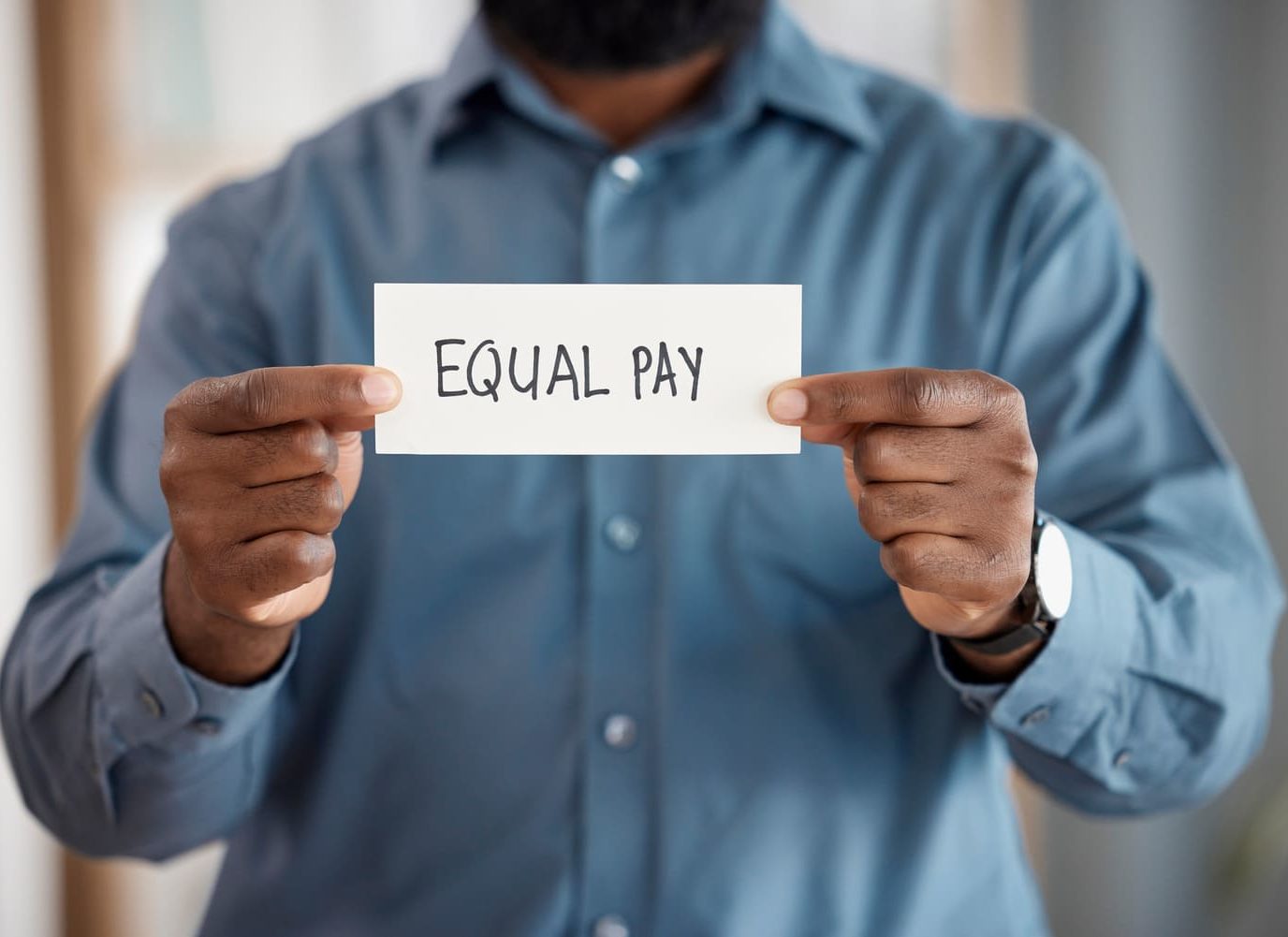
The Fee Is Free Unless You Win.
Top Rated Employment Law Firm
Protecting Families Since 1995
$400 Million Won
TABLE OF CONTENTS
You work a job to receive a salary. It is reasonable to believe that you and your fellow co-workers will receive equal pay for an equal day’s work. When you are paid less than your co-workers for the same job, your employer has violated the law. Federal and local laws protect your right to equal pay as your co-workers in the same or similar positions, regardless of race, national origin, color, sex, sexual orientation, gender identity, pregnancy, disability, age, military status, or any other protected class. For over 25r years, the experienced attorneys at the Derek Smith Law Group in New York City have helped employees, just like you, get the compensation they deserve.
Logically, if you work a job and your co-worker works the same job, and you both started around the same time, you would get the same compensation, right? In a perfect world where everyone followed the law, the answer would be yes. However, there are many times in which the answer is no. Many employers may use other measures, not related to your ability to do a job, to determine your pay rate. Some of these measures may include:
These are known as protected classes and cannot be used to determine pay in any way. When an employer does not pay two employees equal compensation for an equal day’s work, he is in violating the law and discriminating against employees based on protected classes.
The standard federal law that protects employees from discrimination is Title VII of the Civil Rights Act of 1964. Under this law, employers of 15 or more employees cannot discriminate against employees because of their status as members of a protected class. This included unequal pay based on the above-mentioned protected class statuses.
The Equal Pay Act of 1963 is another law that protects men and women from receiving unequal pay based on their gender, if they work for an employer with 15 or more employees. The Age Discrimination in Employment Act of 1967 protects people over 40 from receiving lower compensation based on their age.

The Americans with Disabilities Act of 1990 also protects employees with disabilities from receiving different compensation simply because of their disabilities.
The New York City Human Rights Law protects employees in a company within New York City limits with 4 or more employees from discrimination that affects their compensation.
Finally, there is the Lilly Ledbetter Fair Pay Act of 2009, in which the Supreme Court determined that the time limit to file a claim under any of the federal laws would be extended each time a new paystub was issued with the unequal/illegal compensation.
Proving equal pay violations is more than simply showing that a person makes more money than you. You must be able to show that there is not a legal reason and that the unequal compensation is based on you being a member of a protected class. This can be done through direct evidence, disparate evidence, or policy evidence.
Sometimes, it is legal to pay two employees different wages. While it may look that they are doing the same job on the surface, there may be differences that can legally allow different pay rates. Some of these reasons include:
Different duties. Some employees are provided with supervisor roles, which give them more responsibilities and different duties than their co-workers. They will receive different compensation for their increased responsibilities.
Equal pay violations are more than not getting the same pay rate for the same day’s work. It can be related to allowing employees to discuss salaries, benefits, or even asking about prior salary history in the interview process. Here are some examples of compensation violation in New York City:
Whether you are filing a claim under Title VII, the Equal Pay Act, The Americans with Disabilities Act, or the Age Discrimination in Employment Act, you must start with filing a claim with the Equal Employment Opportunity Commission (EEOC). Because the claim is in New York City, the time limit to file the claim is 300 days instead of the typical 180 days, since New York has a law that emulates Title VII. However, the Lilly Ledbetter Fair Pay Act has extended this statute of limitations to allow the 180 days to start over every time a payroll check is issued with unequal pay rates, potentially extending the time limit indefinitely, or until you are no longer working with the company and no longer receiving pay from that company.
If you wish to file a claim under the New York City Human Rights Law, you must file a claim with the New York City Human Rights Commission. You have one year to file a claim. New York City has a work-sharing agreement for equal pay violations, wherein wherever you file the claim will then submit the claim to other entities to give your claim the best chance for justice.
New York City courts want to make sure you are compensated for the hours you worked and compensated appropriately. Therefore, there are several remedies available through the courts for equal pay violations, including, but not limited to:
Discover how our expertise has helped clients overcome their legal challenges and achieve successful outcomes.
View All TestimonialsDuring the time that I really needed a good counselor and I was approaching different attorneys unfortunately before they heard the problem they were demanding a retainer fee. A friend of mine introduced me to the Derek Smith Law Group and I was very fortunate to be answered by Matt Finkleberg who was very polite and understanding and gave me a lot of confidence without asking for any fees in f... Read Full Testimonial
Matt Finkleberg is by far the best attorney I’ve ever hired!
Matt Finkelberg is an outstanding attorney. It was a pleasure to have him represent me for my employment case. He was very easy to talk to. He was very supportive and knowledgeable throughout the whole process. He explained the entire process to me and kept me informed every step of the way. Matt fought diligently throughout my case to make sure my case was represented best. I am very gratef... Read Full Testimonial
Matt Finkelberg is a top notch lawyer. He is very easy to talk to and truly cared about me as his client. He definitely earned my trust and confidence in his capabilities to represent me in the most professional respects. I give Matt and his firm the Derek Smith Law Group my highest recommendation to anyone who is seeking legal help for employee/employer related matters.
Matt Finkelberg is a life saver. During this whole process not only did I have a great lawyer but I also made a great friend. Matt was very attentive to my case, and mental health. Matt helped me during probably the darkest time of my life and for that I am forever grateful to have came across the Derek Smith law group. As a past client, I 100% recommend Matt Finkleberg. Matt provides a safe sp... Read Full Testimonial
It was a pleasure to have Casey represent and help me for my employment case. It was my first time needing an attorney, so I was a bit apprehensive at first – Casey took the time to answer all of my questions and fully explain everything to me, which really put me at ease. He was very attentive, supportive, and knowledgeable throughout the whole process – Casey would ask questions to ensure... Read Full Testimonial
matt is an excellent attorney. he handled my case with the utmost care and highly exceeded all expectations. i could not recommend derek smith and esp. matt finkelberg enough
It was a pleasure to have Casey represent and help me for my employment case. It was my first time needing an attorney, so I was a bit apprehensive at first – Casey took the time to answer all of my questions and fully explain everything to me, which really put me at ease. He was very attentive, supportive, and knowledgeable throughout the whole process – Casey would ask questions to ensure... Read Full Testimonial
You will be in great hands at this firm! Alyssa the managing paralegal is an absolute professional who excels at what she does. You can tell she truly cares about providing the best service possible, and is passionate about helping her clients. With Alyssa at the helm, this firm is a top-notch choice for anyone seeking assistance. Highly recommend!
Matt Finkelberg is Amazing and Devotional! It was a pleasure to have Matt represent me for my employment case. He was very attentive, supportive, and knowledgable throughout the whole process. Whenever I reached out he responded promptly which I greatly appreciated. Matt fought diligently and hard throughout my case to make sure my case was represented best. Thank you again Matt for everything.... Read Full Testimonial
Olivia is absolutely outstanding! She understands the emotional side of your case while being able to find the legal aspects of holding the employer accountable for breaking the law! Made a really terrible situation a little easier by explaining everything and helping me get everything in order and in the right hands. I would not use anyone else! Call them for any sexual harassment case... You ... Read Full Testimonial
Our dedicated attorneys are ready to fight for your workplace rights and ensure justice!
If you file a claim for equal pay violations, the lawsuit can take anywhere from 4 to 6 months to a year or longer to settle. If your employer is willing to negotiate a fair settlement before going to trial, your case may settle in as little as 4 to 6 months. However, if your employer insists on going to court, your case may take 8 months to a year or longer to prepare for trial. The trial may then last anywhere from a few days to several weeks or longer until a judgment is entered.
While you decide how to handle your compensation claim, here are a few things you can do right not to help your case.
All employees deserve to be compensated appropriately for the work they do.
If you are the victim of equal pay violations in New York City, the experienced attorneys at the Derek Smith Law Group (one of FindLaw’s top firms for employment discrimination) can help.
We have helped our clients win over $165,000,000, and we want to help you. Contact us today at (212) 587-0760 for a free consultation. We do not collect any money until you win your case.

Our experienced legal team provides reliable services in key U.S. cities, ensuring expert assistance for workplace discrimination and employment law matters wherever you are located.
Our experienced employment lawyers are dedicated to resolving your workplace rights concerns with expertise and care.